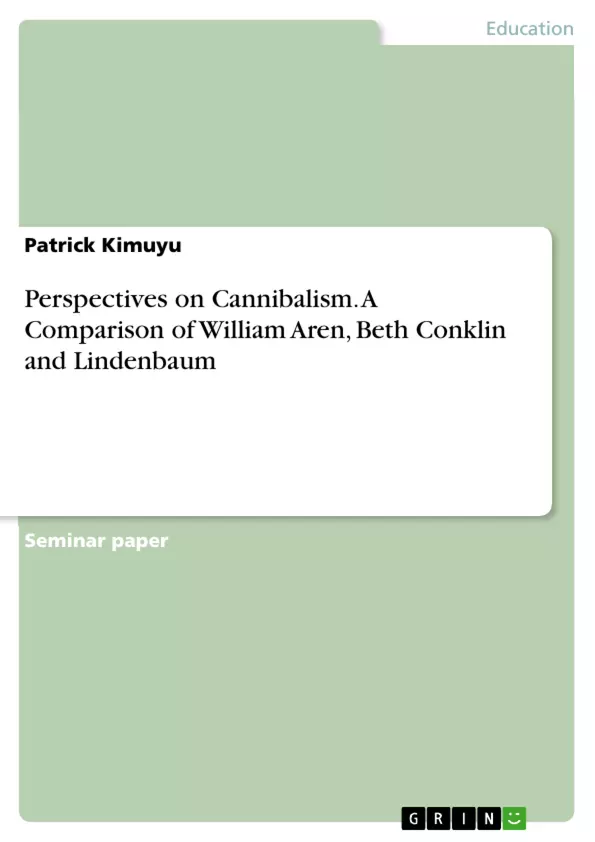The topic of cannibalism in anthropology seems to encompass an unprecedented controversy, owing to the diverse perspectives of different anthropologists. It has remained as one of the ancient taboos across cultures although it is surrounded by mystery, speculation, myth, fear and symbolism.
Historically, the practice of cannibalism is believed to have survived across cultures over centuries to the modern times and, its significance in different cultures varies significantly. Some cultures considered cannibalism as a revered and sacred custom but, in other cultures, it was considered as a sacrilegious and an atrocious practice. It is worth noting that cannibalism seems to have existed among communities, although William Aren’s book "The Man-Eating Myth: Anthropology & Anthropophagy" portrayed the seemingly old-age practice as a myth. This literature sparked an unprecedented criticism from a number of anthropologists such as Beth A. Conklin and Lindenbaum who gave contradictory perspectives.
Therefore, this essay will give a comprehensive discussion of the different perspectives from Aren, Conklin and Lindenbaum over the issue of cannibalism.
Inhaltsverzeichnis (Table of Contents)
- William Aren's, Conklin's and Lindenbaum's Perspectives on Cannibalism
- The Ecological Basis for Aztec Sacrifice
- The Man-Eating Myth: Anthropology & Anthropophagy
- Ritual Cannibalism Among the Wari
- Cannibalism in Papua New Guinea
Zielsetzung und Themenschwerpunkte (Objectives and Key Themes)
This essay aims to provide a comprehensive analysis of the differing perspectives of William Aren, Beth A. Conklin, and Shirley Lindenbaum on the topic of cannibalism in anthropology. It delves into their contrasting viewpoints on the existence, motivations, and cultural significance of cannibalism, particularly contrasting the arguments of Aren, who posits it as a myth, against those who believe it to be a historical and cultural practice.
- The existence and significance of cannibalism as a cultural practice
- The influence of historical narratives and colonial perspectives on understanding cannibalism
- The role of ritual, symbolism, and survival in shaping cannibalistic practices
- The diverse forms of cannibalism, including warfare, mortuary, and dietary cannibalism
- The challenges of interpreting and understanding cannibalism from a cultural and anthropological perspective
Zusammenfassung der Kapitel (Chapter Summaries)
The essay first explores the origins of the debate on cannibalism, focusing on the work of Michael Harner and his argument for cannibalism as an ecological adaptation among the Aztecs. It then analyzes William Aren's perspective, which dismisses cannibalism as a myth, attributing it to Spanish propaganda and misunderstandings during the colonial period. Following this, the essay examines the contrasting views of Conklin and Lindenbaum who argue for the historical and cultural significance of cannibalism, drawing evidence from their research on the Wari people of Brazil and the Fore people of Papua New Guinea respectively.
Conklin's research focuses on the Wari community, who practiced ritual cannibalism in both warfare and funeral contexts, with distinct meanings and motivations for each practice. The Wari engaged in warfare cannibalism as a form of revenge and punishment against their enemies. Their mortuary cannibalism, on the other hand, served as a way to maintain a connection between the living and the dead, expressing compassion and respect for their deceased members. Lindenbaum's work examines the Fore people of Papua New Guinea, who practiced cannibalism as a way of honoring and absorbing the strength of the deceased. These contrasting perspectives, between those who see cannibalism as a myth and those who view it as a real cultural practice, highlight the ongoing debates and challenges in understanding this complex phenomenon.
Schlüsselwörter (Keywords)
The central focus of this essay is the anthropological debate on cannibalism, examining different perspectives on its existence, motivation, and cultural significance. Key terms include: cannibalism, anthropophagy, ritual cannibalism, warfare cannibalism, mortuary cannibalism, dietary cannibalism, cultural anthropology, cultural practices, historical perspectives, colonial narratives, Wari, Fore, and the Aztecs.
Frequently Asked Questions
What is the central debate in William Aren’s work?
William Aren argues in "The Man-Eating Myth" that cannibalism is largely a myth created by colonial powers rather than a widespread cultural practice.
How does Beth Conklin view cannibalism?
Conklin provides evidence of ritual cannibalism among the Wari people in Brazil, distinguishing between warfare (revenge) and mortuary (respect) practices.
What was the motivation for mortuary cannibalism among the Fore people?
According to Shirley Lindenbaum, the Fore people of Papua New Guinea practiced cannibalism to honor the dead and absorb their strength.
What are the different types of cannibalism discussed?
The essay categorizes cannibalism into ritual, warfare, mortuary, and dietary types, each with unique cultural motivations.
Why is cannibalism a controversial topic in anthropology?
It is controversial because it involves navigating colonial biases, myths, and the interpretation of sacred vs. sacrilegious customs across different societies.
- Arbeit zitieren
- Patrick Kimuyu (Autor:in), 2016, Perspectives on Cannibalism. A Comparison of William Aren, Beth Conklin and Lindenbaum, München, GRIN Verlag, https://www.grin.com/document/381150



